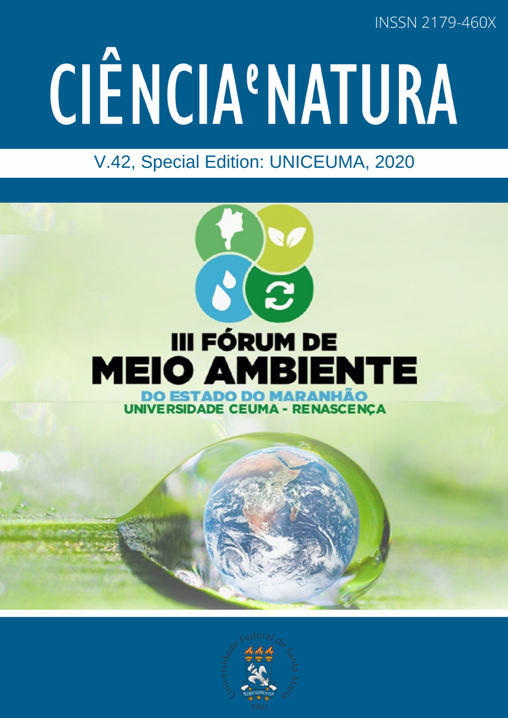Wind Speed Seasonality in a Brazilian Amazon-Savanna Region from the Global Land Data Assimilation System
DOI:
https://doi.org/10.5902/2179460X41092Keywords:
Energy planning, environmental modeling, remote sensingAbstract
The objective of this study was to develop a methodology for the use of remote sensing data for the planning of wind energy projects in Maranhão. Monthly wind speed and precipitation data from 2000 to 2016 were used. Initially, wind velocity data were processed using the principal component analysis (PCA) technique. Next, the grouping technique known as k-means was used. Finally, a linear regression analysis was performed with the objective of identifying the parameters to be used in the validation of the data estimated by the Global Land Data Assimilation System (GLDAS) base against the data measured by the meteorological stations. Four homogeneous zones were identified; the zone with the highest values of monthly average wind speeds is in the northern region of the state on the coast. The period of greatest intensity of the winds was identified to be in the months of October and November. The lowest values of precipitation were observed during these months. The analyses carried out by this study show a favorable scenario for the production of wind energy in the state of Maranhão.
Downloads
References
EPE, E d P E, BalançoEnergético Nacional 2016 - Ano base 2015, Brasília: Ministério de Minas e Energia, 2016.
FILHO, J D C S RIBEIRO, A, COSTA M H, COHEN J C P, ROCHA, E J P. Variaçãosazonal do balanço de radiaçãoemumafloresta tropical no nordeste da Amazônia, RevistaBrasileira de Meteorologia, 2006; 21, 318-330.
FEITOSA F E C S, BELO R C R, SANTOS, J R N, ARAUJO M L S, SANTOS, J. S.; SILVA, F. B. Influência das Mudanças de Tempo e VariabilidadeClimáticasobre a Produção de EnergiaFotovoltaica no Estado do Maranhão (Climate Risk for Photovoltaic Energy Production in the state of Maranhão). REVISTA BRASILEIRA DE GEOGRAFIA FÍSICA, v. 10, p. 1959-1973, 2018.
J JANGID, APURBA KB, MANOJ J, VISHALS, SINGH TP, PRADHAN BK, SANDIPAN D. Potential zones identification for harvesting wind energy resources in desert region of India – A multi criteria evaluation approach using remote sensing and GIS. Renewable and Sustainable Energy Reviews. 2016;65, 1-10.
PREM KC, SIRAJ A, VILASW. Comparative analysis of Weibull parameters for wind data measured from met-mast and remote sensing techniques. Renewable Energy. 2018; 115, 1153-1165.
MATHER P M, KOCH, MAGALY. Preprocessing of Remotely‐Sensed Data, Computer Processing of Remotely-Sensed Images: An Introduction, Fourth Edition, 2010, 87-124.
NORMAN WILDMANN, NIKOLA VASILJEVIC AND THOMAS GERZ, Wind turbine wake measurements with automatically adjusting scanning trajectories in a multi-Doppler lidar setup, Atmospheric Measurement Techniques, 2018;6, 3801-3814.
R. KRISHNAMURTHY, J. REUDER, B. SVARDAL, H.J.S. FERNANDO AND J.B. JAKOBSEN. Offshore Wind Turbine Wake characteristics using Scanning Doppler Lidar, Energy Procedia. 2017; 137, 428-442.
SILVA F B, SANTOS J R N, FEITOSA F E C S, SILVA I D C, ARAÚJO M L S, GUTERRES C E, SANTOS J S RIBEIRO, C V, BEZERRA D S, NERES R L. Evidências de MudançasClimáticasnaRegião de Transição Amazônia-Cerrado no Estado do Maranhão. RevistaBrasileira de Meteorologia (Impresso), 2016; 31, 330-336.
STEFAN E, Wind Data Sources, Wind Energy Meteorology, 2018; 10.1007/978-3-319-72859-9_7, 183-230.
STEFAN EMEIS, NORBERT KALTHOFF, BIANCA ADLER, ERIC PARDYJAK, ALEXANDRE. Paci and Wolfgang Junkermann, High-Resolution Observations of Transport and Exchange Processes in Mountainous Terrain, Atmosphere, 2018; 9, 457.
Published
Versions
- 2022-06-21 (2)
- 2020-12-31 (1)
How to Cite
Issue
Section
License
Copyright (c) 2020 Ciência e Natura

This work is licensed under a Creative Commons Attribution-NonCommercial-ShareAlike 4.0 International License.
To access the DECLARATION AND TRANSFER OF COPYRIGHT AUTHOR’S DECLARATION AND COPYRIGHT LICENSE click here.
Ethical Guidelines for Journal Publication
The Ciência e Natura journal is committed to ensuring ethics in publication and quality of articles.
Conformance to standards of ethical behavior is therefore expected of all parties involved: Authors, Editors, Reviewers, and the Publisher.
In particular,
Authors: Authors should present an objective discussion of the significance of research work as well as sufficient detail and references to permit others to replicate the experiments. Fraudulent or knowingly inaccurate statements constitute unethical behavior and are unacceptable. Review Articles should also be objective, comprehensive, and accurate accounts of the state of the art. The Authors should ensure that their work is entirely original works, and if the work and/or words of others have been used, this has been appropriately acknowledged. Plagiarism in all its forms constitutes unethical publishing behavior and is unacceptable. Submitting the same manuscript to more than one journal concurrently constitutes unethical publishing behavior and is unacceptable. Authors should not submit articles describing essentially the same research to more than one journal. The corresponding Author should ensure that there is a full consensus of all Co-authors in approving the final version of the paper and its submission for publication.
Editors: Editors should evaluate manuscripts exclusively on the basis of their academic merit. An Editor must not use unpublished information in the editor's own research without the express written consent of the Author. Editors should take reasonable responsive measures when ethical complaints have been presented concerning a submitted manuscript or published paper.
Reviewers: Any manuscripts received for review must be treated as confidential documents. Privileged information or ideas obtained through peer review must be kept confidential and not used for personal advantage. Reviewers should be conducted objectively, and observations should be formulated clearly with supporting arguments, so that Authors can use them for improving the paper. Any selected Reviewer who feels unqualified to review the research reported in a manuscript or knows that its prompt review will be impossible should notify the Editor and excuse himself from the review process. Reviewers should not consider manuscripts in which they have conflicts of interest resulting from competitive, collaborative, or other relationships or connections with any of the authors, companies, or institutions connected to the papers.







